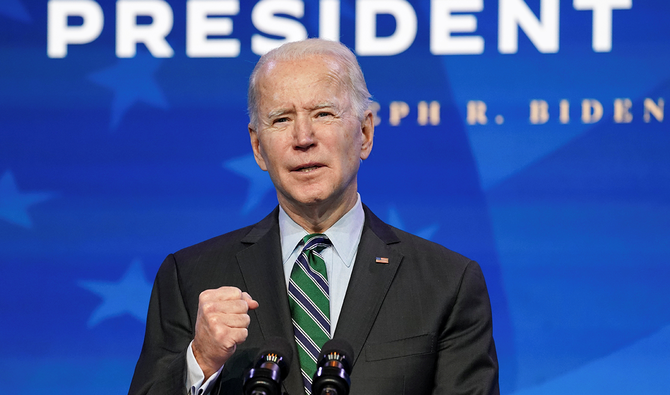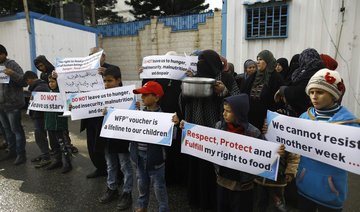WASHINGTON: The Biden administration announced on Wednesday it would provide $235 million in US aid to the Palestinians, restarting funding for the United Nations agency supporting refugees and restoring other assistance cut off by then-President Donald Trump.
The package, including humanitarian, economic and development assistance, was detailed by US Secretary of State Antony Blinken as part of an effort to repair American ties with the Palestinians that all but collapsed during Trump’s tenure.
It marked Democratic President Joe Biden’s most significant move since taking office on Jan. 20 to make good on his promise to roll back some components of his Republican predecessor’s approach that Palestinians denounced as heavily biased in favor of Israel.
The plan calls for $150 million through the United Nations relief agency UNRWA, $75 million in US economic and development assistance and $10 million for peace-building programs, Blinken said in a statement.
Biden’s aides have also signaled that they want to re-establish the goal of a negotiated two-state solution as a priority in US policy on the Israeli-Palestinian conflict.
But they have moved cautiously so far, and any major steps are likely to wait for the dust to clear after Israel’s inconclusive March election, which will be followed by Palestinian elections scheduled in coming months.
The Trump administration blocked nearly all aid after it severed ties with the Palestinian Authority in 2018. The move was widely seen as an attempt to force the Palestinians to negotiate with Israel on terms the Palestinian leadership branded as an effort to deny them a viable state.
The cuts came after Palestinian leaders decided to boycott the Trump administration’s peace efforts over its decision to recognize Jerusalem as the capital of Israel and move the US embassy there from Tel Aviv, upending decades of American policy.
This included rescinding funding for the United Nations Relief and Works Agency (UNRWA), which provides aid and relief services to around 5.7 million registered Palestinian refugees in the occupied West Bank, Gaza Strip and across the Middle East.
“The United States is pleased to announce that, working with Congress, we plan to restart US economic, development, and humanitarian assistance for the Palestinian people,” Blinken said.
Ahmed Abu Huly, a member of the Executive Committee of the Palestine Liberation Organization (PLO), said he would be holding a Zoom meeting with US State Department official Richard Albright to express appreciation for the “very important support” and said he hoped it would continue.
Israeli Foreign Ministry spokesman Lior Haiat said: “In respect to UNRWA, Israel’s position is that the organization in its present form perpetuates the conflict rather than helping to resolve it. Therefore, the renewal of assistance to UNRWA must be accompanied by substantial and vital changes to its nature, goals and organizational conduct.”
The United Nations welcomed the restart of UNRWA funding. “There were a number of countries that had greatly reduced to halted contributions to UNRWA. We hope that the American decision will lead others to rejoin ... as UNRWA donors,” UN spokesman Stephane Dujarric told reporters.
UNRWA Commissioner-General Philippe Lazzarini told Reuters the new funding was “extremely welcome” but said it was also important to have the United States back as “strategic partners” politically.
Blinken said the United States was also “resuming vital security assistance programs” with the Palestinians but did not elaborate.
However, the administration is likely to hold back for now on resuming direct economic aid to the Palestinian Authority while Biden’s aides consult with Congress on potential legal obstacles, according to one person familiar with the matter. The notice to Congress assured lawmakers that all assistance would be consistent with US law.
The money that will go to UNRWA does not immediately restore contributions to the $365 million level that the United States gave to the agency in 2017.
Most of the refugees assisted by UNRWA are descendants of some 700,000 Palestinians who were driven out of their homes or fled fighting in the 1948 war that led to Israel’s creation.
The growing refugee count was cited by the Trump administration in its 2018 defunding, with then-State Department spokeswoman Heather Nauert criticizing UNRWA over what she called an “endlessly and exponentially expanding community of entitled beneficiaries.”
Right-wing Israeli Prime Minister Benjamin Netanyahu, who developed close ties with Trump, has also called for the dismantling of UNRWA.
Soon after Biden took office, his administration began laying the groundwork for restored relations with the Palestinians as well as renewed aid. Biden’s aides are crafting a more detailed plan to reset ties, two people familiar with the matter told Reuters in mid-March.
The administration announced late last month it was giving $15 million to vulnerable Palestinian communities in the West Bank and Gaza to help fight the COVID-19 pandemic.
US restores Palestinian aid with $235m package
https://arab.news/9vnnx
US restores Palestinian aid with $235m package

- Secretary of State Antony Blinken reveals package that includes $150 million in humanitarian assistance for the UN relief agency
- A further $75 million provided for economic and development assistance in the West Bank and Gaza
Iran unrest persists, top judge warns protesters

- Demonstrations sparked by soaring inflation
- Western provinces worst affected
DUBAI: Iran’s top judge warned protesters on Wednesday there would be “no leniency for those who help the enemy against the Islamic Republic,” while accusing Israel and the US of pursuing hybrid methods to disrupt the country.
The current protests, the biggest wave of dissent in three years, began last month in Tehran’s Grand Bazaar by shopkeepers condemning the currency’s free fall.
Unrest has since spread nationwide amid deepening distress over economic hardships, including rocketing inflation driven by mismanagement and Western sanctions, and curbs on political and social freedoms.
“Following announcements by Israel and the US president, there is no excuse for those coming to the streets for riots and unrest, chief justice Gholamhossein Mohseni Ejei, the head of Iran’s judiciary, was quoted as saying by state media.
“From now on, there will be no leniency for whoever helps the enemy against the Islamic Republic and the calm of the people,” Ejei said.
Iranian authorities have not given a death toll for protesters, but have said at least two members of the security services have died and more than a dozen have been injured.
Iran’s western provinces have witnessed the most violent protests.
“During the funeral of two people in Malekshahi on Tuesday, a number of attendees began chanting harsh, anti-system slogans,” said Iran’s Fars, news agency.
After the funeral, Fars said, “about 100 mourners went into the city and trashed three banks ... Some started shooting at the police trying to disperse them.”
The semi-official Mehr news agency said protesters stormed a food store and emptied bags of rice, which has been affected by galloping inflation that has made ordinary staples increasingly unaffordable for many Iranians.












